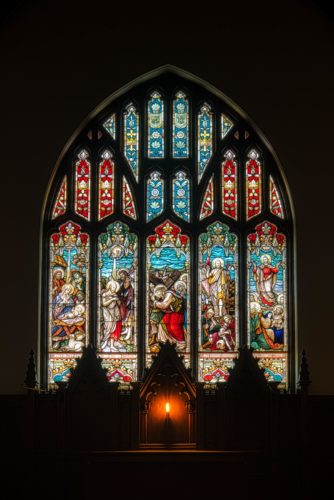Advent Week 3: Love
December 16, 2022

Love Does: Recovering the “Telos” of Biblical Love During Advent by Dr. Jacob Pratt
“As I have loved you, so you must love one another. By this everyone will know that you are my disciples, if you love one another.” – John 13:34-35
Love is a pervasive theme in the Scriptures. Depending on your English translation, the word occurs as many as 561 times. Yet, as prevalent a theme as it is in the Scriptures, it is noticeably absent in our contemporary culture. At least in my lifetime, I have never witnessed a more divisive political landscape marked by vitriol and hatred. And yet, it is just for this fallen condition that God sent his Son, Jesus, to demonstrate the ultimate act of love on the cross.
 It is common around Christmas time for churches to light an Advent candle reflecting upon a specific aspect of the birth of King Jesus. Such traditions typically culminate with the “love” candle. But what is “love”? An emotion? An action? The answer is, “Yes”!
It is common around Christmas time for churches to light an Advent candle reflecting upon a specific aspect of the birth of King Jesus. Such traditions typically culminate with the “love” candle. But what is “love”? An emotion? An action? The answer is, “Yes”!
In Deuteronomy 6:5 (the Shema), Moses states: Love the Lord your God with all your heart, with all your soul, and with all your strength. Biblical love emerges from the “heart,” the seat of human emotion. And a love for God that is void of affections leads to a relationship marked by mere duty or obligation. Some have called this condition the “debtors ethic” syndrome, a gratitude-based obedience built on the misguided notion that we owe God. Such a view potentially robs the believer of any sense of joy. Yet God’s love through Christ cannot be repaid.
While love is no less than an emotion, it is so much more. Jesus states in John 13:34-35 (NIV): A new command I give you: Love one another. As I have loved you, so you must love one another. By this everyone will know that you are my disciples, if you love one another. In short, love is a verb, an action. Love “does”! One might wonder what is “new” about Jesus’ command here. The OT certainly mandates a “horizontal” love as an extension of the great Shema in texts like Leviticus 19:18 (You shall love your neighbor as yourself). John Piper suggests, however, that what is “new” about this command is that Jesus now functions as both the “pattern” we live by and the “power” we live on as we seek to display biblical love.
Consequently, biblical love has its “center,” fundamentally, in Christ. He is the standard and the source. However, I would argue that biblical love has its “telos,” or “goal” in the Church. It is, according to John, the defining mark of a true disciple. Vertical love displayed through horizontal love, within the body of Christ, is such a powerful force that Peter can say that love covers a multitude of sins (1 Peter 4:8). His command, then, is to love one another deeply. This truth should come as both an encouragement and a challenge. In the midst of your failures and periods of uncertainty know that your love, even if imperfect, marks you as a child of God. Yet, challenge yourself, especially during the season of Advent, to take your love to the next level, to love others more deeply, more selflessly, more like Christ.
Love in the NT by Dr. Drew Ham
“For God loved the world in this way: He gave his one and only Son, so that everyone who believes in him will not perish but have eternal life.” – John 3:16
READ: Luke 2, John 3:16, I John 4:7-21
You know the story: Christmas Day. A baby all wrapped up, “in swaddling clothes,” lying in the arms of his parents. While that is not exactly how the Bible verse goes (Luke 2:12), in 2004 I was the father holding my first-born son. My beautiful bride had just given birth, and I was overcome with joy. We were sitting in a hospital room. It was snowing outside, and I was holding this incredible gift of life with my wife at my side. I was so happy, so full of love, that tears just rolled down my face.
I cannot help but think back to Joseph and Mary, the parents of Jesus. What must they have been thinking? What were the emotions that poured out of their soul? I suspect they were similar to my own.
Although the Bible says little about Joseph, he knew the significance of this baby. Matthew 1 tells us that Joseph knew that Jesus was conceived by the Holy Spirit and coming to “save his people from their sins.” Jesus was the promised Messiah! While Joseph had doubts (he had planned to dissolve his engagement with Mary due to the suspected infidelity), an angel appeared to him and explained the situation. This boy was chosen by God!
While my love for my son is significant, the Bible is clear that God’s love for us is unfathomable (see Ephesians 3:19). In fact, John 3:16 is quite clear, “For God so loved the world, that He gave his one and only Son” (emphasis added). I cannot speak for anyone else, but I could not imagine loving something else so much that I would send my son to die.
But, let’s look even deeper. Romans 5:8 explains, “God demonstrates His own love toward us, in that while we were still sinners, Christ died for us.” While I was a sinner, Christ loved me so much that died for me! One of the most helpful pictures of this amazing love comes from the book of Hosea.
 The marriage and relationship of Hosea and Gomer is problematic, to say the least. Gomer left Hosea to become a temple prostitute. During the time, when the temple was no longer in need of her services, she was sold at auction (think human slavery). The Bible explains that Hosea went to the auction to buy her back! Based on the description that Hosea used money and grain, some scholars suggest that Hosea took every earthly possession of any value that he owned. He was willing to give it all for her!
The marriage and relationship of Hosea and Gomer is problematic, to say the least. Gomer left Hosea to become a temple prostitute. During the time, when the temple was no longer in need of her services, she was sold at auction (think human slavery). The Bible explains that Hosea went to the auction to buy her back! Based on the description that Hosea used money and grain, some scholars suggest that Hosea took every earthly possession of any value that he owned. He was willing to give it all for her!
Now, imagine this scenario from Gomer’s perspective: stripped naked in front of the audience, unwanted by men, she now sees her faithful husband. Imagine the embarrassment. The shame! And then, he bid on her, and bought her back!
The Scripture does not suggest that Gomer wanted to be bought by Hosea, but that is exactly what he does! He buys her back. Perhaps he gave all he owned.
This is what God did for us! Because of His great love, “while we were yet sinners, Christ died for us.”
As you look upon that sleeping child in a manger, remember God loved you so much that He sent His son to die for you! “While still a sinner, Christ died for me!”
For the Love of God by Dr. Scott Hildreth
“And the LORD God made for Adam and for his wife garments of skins and clothed them.” – Genesis 3:21
In Genesis 3, we see a beautiful picture of God’s love. The story basics are familiar:
- God created the world and said that it was “very good.”
- Adam and Eve were free to enjoy this good creation with one rule.
- Adam and Eve broke God’s rule and plunged the world into chaos.
What happens next displays God’s grace and foreshadows the salvation we celebrate at Christmas.
First, they experience the shame of sin.
The Bible tells us that their eyes were opened, but the first thing Adam and Eve did was cover themselves. Guilt overwhelmed them and they knew something was wrong.
Second, they hid from God.
We know how this works, don’t we? When we do something offensive, the last place we want to be is with the person we have offended.
However, God’s response to this catastrophe displays his love and charts the course for the rest of the Bible.
First, he comes to them.
“In this is love, not that we have loved God, but that he loved us…” (1 John 4:10)
God takes the initiative in salvation. Adam and Eve think they are hidden. But God knows, and rather than leaving them in their sin, he comes to them. He loves them too much to allow them to remain in their sin.
Second, he acknowledges their guilt.
The gospel is Good News. Yet, this news is only “good” after we understand the depth of our sin and its consequences. Without Christ, we are hopelessly lost.
Third, God covers their shame.
Adam and Eve knew they were in trouble. Fear and shame overwhelmed them. In response, they grabbed some leaves in an attempt to fix the problem. Now, if there is one thing we know about cut flowers, it is that the beauty they bring is temporary. In other words, Adam and Eve’s best solution was inadequate.
They knew they had a problem, and they also knew they needed help, but this help was beyond their grasp. As you think about what God did next, reflect on the words of Paul in Romans 5:8, “But God demonstrated his own love… while we were still sinners Christ died for us.”
Now consider the words of Genesis 3:21, “And the LORD God made for Adam and for his wife garments of skins and clothed them.”
You see, what Adam and Eve could not do for themselves, God did. He covered their shame!
This is what we celebrate at Christmas.
Consider the words of this Carol:
O Holy Night! The stars are brightly shining
It is the night of the dear Saviour’s birth
Long lay the world in sin and error pining
Till He appeared and the Spirit felt its worth
A thrill of hope the weary world rejoices
For yonder breaks a new and glorious morn…
A Love Incomparable by Mr. Ryan Hutchinson
“For God loved the world in this way: He gave his one and only Son, so that everyone who believes in him will not perish but have eternal life.” – John 3:16
 Love is both a term that is freely and sparingly used in our society. We talk about loving chocolate cake, loving our favorite sports team, loving a certain genre of music, or even loving certain seasons of the year. In this sense, the term love is tossed around freely like any other word. It is simply a way to note that something is higher up on our like scale than something else, a term of contrast to things we do not like as much. However, there are times where the word carries a significant amount of weight and is approached with caution as to not dispense it at the wrong time or in the wrong setting. Using the term “I love you” in dating usually takes time to say to ensure the words are not premature, since they represent a major state in a relationship. This kind of love is on a higher plane than our love for our favorite sports team. Love is now moving in the direction of not being a contrast to things you like less, but a connection that moves to action and personal sacrifice.
Love is both a term that is freely and sparingly used in our society. We talk about loving chocolate cake, loving our favorite sports team, loving a certain genre of music, or even loving certain seasons of the year. In this sense, the term love is tossed around freely like any other word. It is simply a way to note that something is higher up on our like scale than something else, a term of contrast to things we do not like as much. However, there are times where the word carries a significant amount of weight and is approached with caution as to not dispense it at the wrong time or in the wrong setting. Using the term “I love you” in dating usually takes time to say to ensure the words are not premature, since they represent a major state in a relationship. This kind of love is on a higher plane than our love for our favorite sports team. Love is now moving in the direction of not being a contrast to things you like less, but a connection that moves to action and personal sacrifice.
While love is used at varying levels of significance in our daily parlance, there is a love that was shown to us — that is on the highest plane. It is the love that was shown in God sending Christ to die for us, so we might have eternal life. Sacrifice was involved, but not sacrifice for those that loved God back. The love that was exhibited by God was a great sacrifice towards us while we were children of wrath according to Ephesians 2:3. The world had rejected God, but God still loved the world. Not only was this love directed to us who did not love God, but it came through an event that rocked the very foundation of all that existed. Jesus, the only begotten Son of God, the second person of the Trinity, God the Son, the creator and sustainer of all that is, was sent to step out of Heaven for a rebellious people, humble himself by taking on flesh, live a perfect life while being tempted at every turn, and endure the suffering and shame of the cross.
There are no human metaphors to capture the greatness of all that was involved in this act of love. This love is the highest form of love. This love is not an emotion that ebbs and flows with the waves of changing appetites. This love is incomparable. In this season of Advent, we celebrate a love that we can never fathom or repay. We celebrate the love of God in sending his Son. When God became flesh, was born as a baby and made those first beautiful cooing sounds, it was not simply the beauty of the birth of another child. It was a love lavished on us so that we might receive what we could never obtain on our own, salvation. This season meditate on the greatness of God’s love and be an instrument of his grace to proclaim that love to the world around you.
Prayer by Mrs. Kim Humphrey
Dear Father,
Wow, what love you have for us to give us your Son, so that anyone who believes will have eternal life! Life with you in your eternal kingdom! Lord, thank you for loving us enough to send this babe to a sinful and fallen people in order to redeem us if we believe and repent of our sinful lifestyles. Thank you for not giving up on us, for the forgiveness you offer and restoration you provide. Father, this love you gave the world is the reason for the celebration of Advent, the birth of Jesus, your Son. May we not get so caught up in the trappings of parties and gifts that we forget about the True Gift given to the world. Your Son, Jesus Christ. Thank you, Father.
In Your Name I pray,
Amen